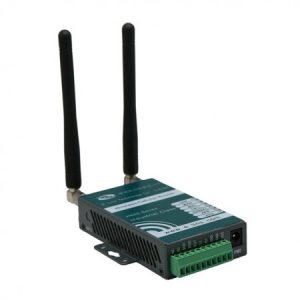E-Lins manufacture embedded mobile broadband routers and devices including 3G routers, 4G routers and 5G Routers with popular products including the H685 4G router, H820 4G router and the H900 4G Router.
E-Lins are now manufacturing 5G versions of the H685 and H900 routers providing a great solution for high speed 5G Internet connectivity ideal for 5G CCTV Internet connection for use with a 5G Fixed IP SIM Card for quick and easy remote access to your CCTV NVR and IP cameras.
E-Lins 4G Routers are manufactured to a high standard and provide a low cost 4G M2M Router solution for your remote monitoring and management application.
Industrial 5G Routers
If you need a 5G router for remote access and monitoring (Machine to Machine / M2M) then you will probably not want to use a 5G router designed for home or office use as these may go offline and because they are usually installed in a home or office they can simply be powered off and on and this will reconnect to the 4G / 5G mobile network.
If you have a router connected to the 5G network in the field at a remote location, connected to your CCTV, kiosk, digital signage or water management application then if the router is disconnected by the mobile network it is inconvenient, time consuming and expensive to drive to site and power the router off and on to get it to reconnect to the 5G network.
The reason that permanently connected 4G and 5G devices such as 4G routers get disconnected is because the 4G/5G mobile networks are designed to provide an always available service and not an always on network. This means that if a 4G/5G basestation can have 500 simultaneous connections and there are 600 users then when a new user needs a connection it will have to disconnect one of the devices, so this might be your 5G router that has been permanently connected for four or five days. The router can still see the 5G basestation and the basestation replies to the keep alive messages but the router cannot access the internet.
This is where a feature such as ping reboot on an industrial grade 5G router comes into play. You can configure your router to ping an IP address on the internet to confirm that the router can access the internet rather than just access the local mobile basestation and in the event that the router can no longer access the Internet the router can reboot and re-establish the 5G connection and will be a new connection on the basestation.
Industrial 5G routers can also have features like a second SIM card slot so if the primary network SIM card cannot connect to the network, the router can fail-over to the backup network, therefore ensuring a more reliable 5G Internet connection.
Many users of industrial 4G / 5G routers will use them with a fixed IP SIM Card, giving the user remote access to the router and connected devices which means that this type of router, being used with a Fixed IP SIM Card can also be used as a VPN server to enable remote connection for a VPN client user and industrial 5G routers have VPN server and also VPN client capabilities. These 5G VPN routers will usually support Open VPN and IPSEC.
The E-lins 4G and 5G Routers are compatible with a wide range of 4G and 5G Antennas to ensure that the router can receive a strong network cellular signal for optimum performance.
IoT SIM Cards
IoT SIMs, Roaming SIMs, and 4G Routers for Remote Access and Monitoring
The rise of Industry 4.0 demands constant connectivity and data flow from remote industrial sites. This is where specialized connectivity solutions like IoT SIM cards and roaming SIM cards paired with powerful industrial 4G routers take center stage. Let’s explore how this dynamic trio unlocks efficient remote access and monitoring in industrial environments:
IoT SIM Cards:
- Designed for low-power, low-data transmission typical of industrial sensors and actuators.
- Offer flexible data plans tailored to specific applications, optimizing costs.
- Often come with robust security features to protect sensitive industrial data.
- Some offer multi-network roaming within a country, ensuring seamless connectivity even in remote locations.
Roaming SIM Cards:
- Ideal for mobile equipment or geographically dispersed assets.
- Enable automatic network switching across different providers, guaranteeing uninterrupted connectivity even when crossing borders.
- Provide global coverage for monitoring and managing assets across continents.
- May have higher data costs compared to domestic IoT SIMs.
Industrial 4G Routers:
- Built for harsh industrial environments withstanding extreme temperatures, dust, and vibrations.
- Offer secure VPN connections for data encryption and access control.
- Support multiple communication protocols (Ethernet, Wi-Fi, etc.) for versatile equipment integration.
- Can act as miniaturized IT gateways for remote data aggregation and processing.
Together, these solutions unlock powerful capabilities:
- Remote equipment monitoring: Track performance, detect anomalies, and optimize operations in real-time.
- Preventive maintenance: Schedule maintenance based on sensor data, avoiding costly breakdowns.
- Asset tracking and management: Locate equipment, improve logistics, and prevent theft.
- Data gathering and analysis: Collect valuable insights for process optimization and informed decision-making.
Choosing the right combination:
The ideal setup depends on factors like your application, data usage, geographic area, and budget. Consult with connectivity providers and router manufacturers to tailor a solution that meets your specific needs.
Embrace the power of IoT SIMs, roaming SIMs, and industrial 4G routers to transform your remote industrial operations into a connected, data-driven powerhouse.




